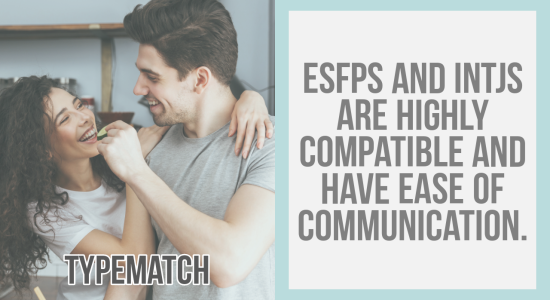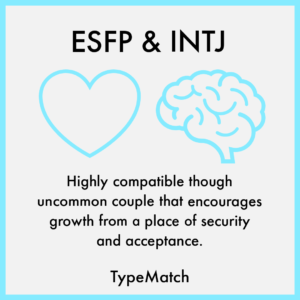ESFP and INTJ Relationship
Are ESFP and INTJ Relationships Compatible?
ESFP and INTJ relationships, called duality relationships, have the highest romantic compatibility. INTJ and ESFP relationships are considered the most optimal because of the close psychological distance between the types. As a result, they communicate easily without the need to translate their minds, and they can be completely themselves. They quickly see that they can relax around each other and that the other person doesn’t care about their weaknesses. For this reason, INTJs and ESFPs move into deep and vulnerable conversations and act naturally in front of each other from an early stage. With each other’s help they dive deeply into who they are and become more authentically themselves. The process of assisted self-discovery intoxicates and excites both partners, making them shirk all other relationships for a time to focus on this one highly rewarding relationship.
ESFP and INTJ relationships are highly compatible and rank as one of the top pairs in the TypeMatch dating app. Below we explain more about the highs and lows of ESFP and INTJ relationships.
ESFP and INTJ Attraction
While ESFPs and INTJs interact easily, they often do not immediately notice each other as attractive. In fact, if they do not have compatible values or interests, they may not interest each other at all. From a superficial point of view, it first appears like they are extremely different and they have a hard time recognizing the depth of what they share. They have an especially hard time if they lack experience in meeting someone of this personality type. So, because of their failure to notice each other, this relationship pairing is less common than it should be given the degree to which they are compatible. The problem of meeting each other and sparking initial attraction increases in younger pairs who may not have the experience or self-awareness to know the internal qualities they most want in a partner.
INTJ and ESFP Love
When INTJs and ESFPs actually meet and spark an attraction, they find their similarities and differences perfectly aligned. They understand each other and seem to fit together in a synergistic relationship. Over time, the pair become extremely close and may risk losing their sense of self apart from the relationship. They become so intertwined that their identity feels like one. As a result, if a split does happen, both people feel like they have lost a large part of themselves. As such, the couple must maintain individual activities, friendships, and interests outside of the bounds of the relationship. Becoming fully integrated with each other feels extremely powerful, but both parties lose some of what their partner found so attractive about them in the first place if they become too dependent on the relationship to meet their needs.
When it comes to dating and relationships, INTJs are notoriously hard to read and elusive. If you’re dating or trying to date an INTJ, download our guide with our top 20 pieces of practical advice for dating an INTJ. INTJ Dating Guide

Perfect Partnership
Furthermore, this couple is the perfect life partner because they neither compete in their roles nor expose the insecurities of each other. Their natural differences allow them to fall easily into roles that align with their respective strengths and complement each other. This relationship allows them to relieve each other and themselves from the stress of having to perform duties to which they are not well suited and do not have much capacity to develop. As a result, both feel freer and energized to do what they do best.
Secure and Calming Relationship
As long as they share interests and values, ESFPs and INTJs feel secure and calm together. It’s no wonder that they want to spend all of their time together as everything is more fun together. INTJs and ESFPs enjoy playing and joking with each other as best friends do. They find each other amusing and know how to lift each other’s spirits easily.
ESFPs and INTJs not only enjoy activities together but also deep conversations where they can expand their minds. It seems they never run out of topics to discuss and always enjoy bouncing things off of each other. These deep conversations allow them to go deep into their psyches and emotions, helping them to grow in understanding and acceptance of themselves. Through this relationship, they may internally heal past emotional hang-ups. Finally, through the security of the relationship, both partners have the opportunity to grow and feel ready to take on new challenges and goals.
Because the relationship is a place of security and acceptance for them, this pair often closes itself off to the rest of the world. It may not be a codependent behavior but rather a realization of who they are that makes them act in better alignment with themselves. As a result, they become more selective of what and who they let into their lives.
Final Thoughts
Finally, it’s important to remember that not all people of the same personality type are equally suited for each other. Who a person is in terms of life experiences, culture, values, and beliefs, plays an important role in the success of a relationship. Moreover, the emotional and psychological health of each individual affects the success of a relationship. So, relationship decisions should not be made based on typology alone.

More Resources for ESFP & INTJ Relationships
Sources:
A.V. Bukalov, G. Boiko, “Why Saddam Hussein made a mistake, or what is Socionics”
Ekaterina Filatova “Art of understanding yourself and others”
Eugene Gorenko, Vladimir Tolstikov, “Nature of self”
I.D. Vaisband, publications on Socionics
Laima Stankevichyute “Intertype relations”
O.B. Slinko, “The key to heart – Socionics”
R.K. Sedih, “Informational psychoanalysis”
Sergei Ganin
Valentina Meged, Anatoly Ovcharov
V.V. Gulenko “Criteria of reciprocity”
V.V. Gulenko, A.V. Molodtsev, “Introduction to socionics”






